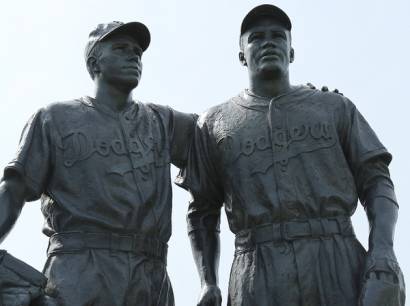This Week's Story
subscribe to podcast [click here] or play audio below
Jackie Robinson agrees to be harrassed, in hopes of breaking the color barrier in American Major League baseball.

This Week’s Story relives American history and the Bible through brief inspiring stories presented on mp3 audio recordings and text for reading.
I Promise
“Because you are black, you will be called nasty names. Pitchers will pitch bean-balls at you. You will be threatened. Teammates will ignore you. You will be the loneliest man in Major League Baseball! Virtually nobody will be on your side. No owners, no umpires, very few newspapermen.
“Will you agree that for three years you will not fight back when you are humiliated? If so, I want you to play for the Brooklyn Dodgers team.”
The man speaking was Branch Rickey, manager of the Brooklyn Dodgers, a top team in Major League Baseball. The year was 1945 and the most popular national sport was baseball. No blacks were accepted to play in American Major League baseball.
Branch Rickey, a white man, did not agree with the practice. He began to look for a black baseball player to play on the Brooklyn Dodgers team, a player who was highly skilled, intelligent, and courageous. His choice was Jackie Robinson. He wondered would Jackie accept an offer to join the Brooklyn Dodgers?
Jackie knew losing and he knew winning. He had grown up on a block in Pasadena, California, where his family was the only black family.
His mother raised him and his four siblings after their father deserted his family. As a student at the University of California at Los Angeles he was an outstanding athlete and the first there to win varsity letters in four sports. In the Army as a lieutenant he was arrested for refusing to move to the back of a segregated bus. The sign at the front of the bus read, “Colored seat from the rear.” Through that incident he was discharged from the Army. For years Jackie had been tested. Now he faced a new test.
Jackie promised Rickey, “For three years I’ll accept whatever abuse comes to me for being the first and only black baseball player in American Major League baseball.”
When he was sent to play with the Dodgers, teammates signed a petition against his appearance on the field. He was jeered, threatened, shoved, stepped on, locked out of ball parks, and isolated; but gradually his teammates began to respect him. At the end of his first year with the team, he was selected to be the National League Rookie of the Year, the best new player in the league.
At a Dodger game one of Jackie’s teammates, a shortstop named Pee Wee Reese, ran across the field to talk with Jackie. As Pee Wee put a friendly hand on Jackie’s shoulder, a photographer took a picture of the two men. That picture was in newspapers throughout the country. People realized that the Brooklyn Dodgers had a superb black player, who was accepted by teammates. The team’s struggles with prejudices bound them together. Over the next nine years the team with Jackie’s help won six National League pennants and defeated the New York Yankees in the 1955 World Series. In 1962 Jackie was inducted into baseball’s highest honor: the Hall of Fame.
American League President Gene Budig stated, “He led America by example. He reminded our people of what was right and he reminded them of what was wrong.”
Jackie’s friend and teammate, Shortstop Pee Wee Reese, reflected, “Thinking about the things that happened, I don’t know any other ball player who could have done what he did - to be able to hit with everybody yelling at him. He had to block all that out, block out everything but this ball that is coming in at a hundred miles an hour. To do what he did has got to be the most tremendous thing I’ve ever seen in sports.”
This is Barbara Steiner and it is my pleasure to share highlights of the Jackie Robinson story.
<< previous story] [next story >>
We invite your comments! [click here to comment]
This Week's Story is a non-profit supported by listeners. [click here to make a donation]
